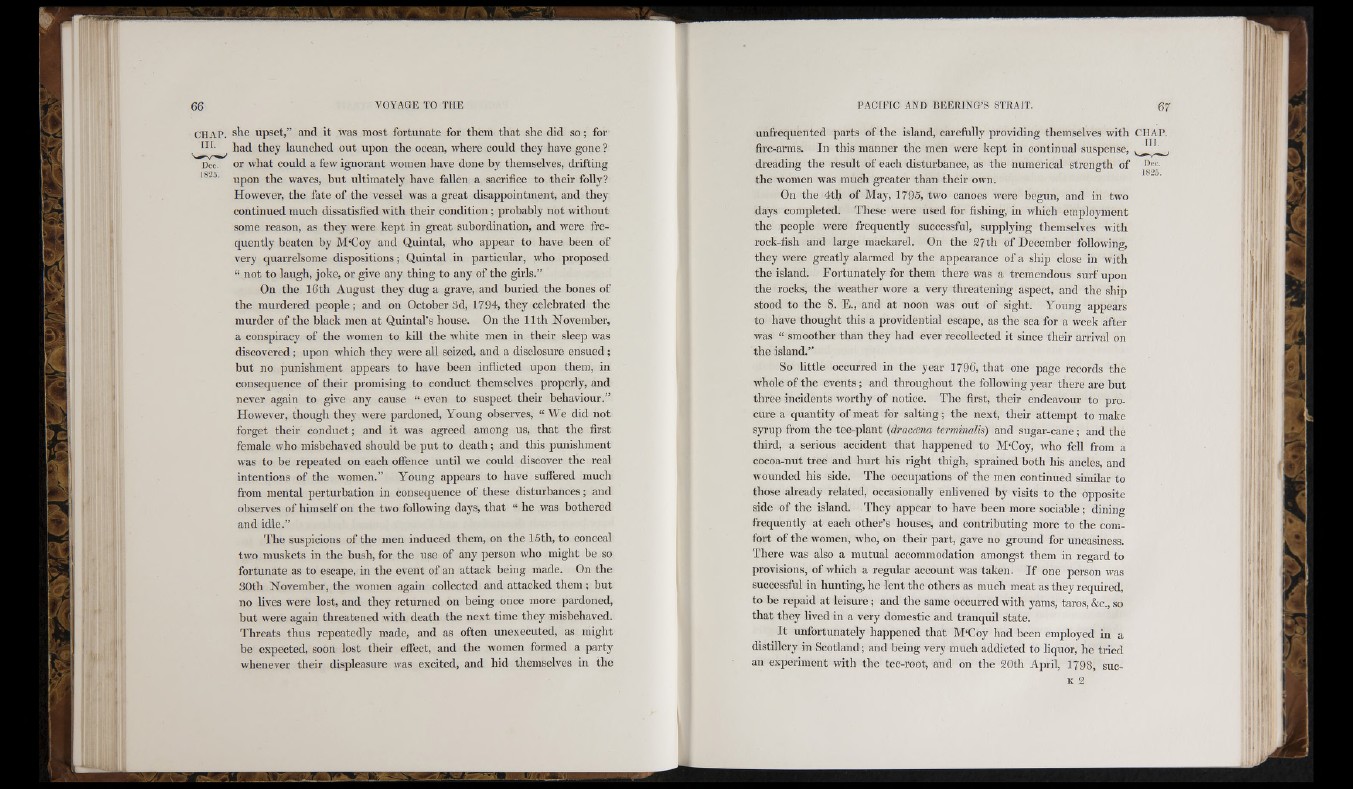
CHAP. she upset,” and it was most fortunate for them that she did s o ; for
•II had they launched out upon the ocean, where could they have gone?
Dec or what could a few ignorant women have done by themselves, drifting
upon the waves, but ultimately have fallen a sacrifice to their folly?
However, the fate of tlie vessel was a great disappointment, and they
continued much dissatisfied with their condition ; probably not without
some reason, as they were kept in great subordination, and were frequently
beaten by M‘Coy and Quintal, who appear to have been of
very quarrelsome dispositions; Quintal in particular, who proposed
“ not to laugh, joke, or give any thing to any of the girls.”
On the 16th August they dug a grave, and buried the bones of
the murdered people; and on October 3d, 1794, they celebrated the
murder of the black men at Quintal’s house. On the 11th November,
a conspiracy of the women to kill the white men in their sleep was
discovered; upon which they were all seized, and a disclosure ensued;
but no punishment appears to have been inflicted upon them, in
consequence of their promising to conduct themselves properly, and
never again to give any cause “ even to suspect their behaviour.”
However, though they were pardoned. Young observes, “W e did not
forget their conduct; and it was agreed among us, that the first
female who misbehaved should be put to death ; and this punishment
was to be repeated on each offence until we could discover the real
intentions of the women.” Young appears to have suffered much
from mental perturbation in consequence of these disturbances; and
observes of himself on the two following days, that “ he was bothered
and idle.”
The suspicions of the men induced them, on the 15th, to conceal
two muskets in the bush, for the use of any person who might be so
fortunate as to escape, in the event of an attack being made. On the
SOth November, the women again collected and attacked them ; but
no lives were lost, and they returned on being once more pardoned,
but were again threatened with death the next time they misbehaved.
Threats thus repeatedly made, and as often unexecuted, as might
be expected, soon lost their effect, and the women formed a party
whenever their displeasure was excited, and hid themselves in the
unfrequented parts of the island, carefully providing themselves with
fire-arms. In tliis manner the men were kept in continual suspense,
dreading the result of each disturbance, as the numerical strength of
the women was much greater than their own.
On the 4th of May, 1795, two canoes were begun, and in two
days completed. These were used for fishing, in which employment
the people were frequently successful, supplying themselves with
rock-fish and large mackarel. On the 2?th of December following,
they were greatly alarmed by the appearance of a ship close in with
the island. Eortunately for them there was a tremendous surf upon
the rocks, the weather wore a very threatening aspect, and the ship
stood to the S. E., and at noon was out of sight. Young appears
to have thought this a providential escape, as the sea for a week after
was “ smoother than they had ever recollected it since their arrival on
the island.”
So little occurred in the year 1796, that one page records the
whole of the events; and throughout the following year there are but
three incidents worthy of notice. The first, their endeavour to procure
a quantity of meat for salting; the next, their attempt to make
syrup from the tee-plant {draceena terminalis) and sugar-cane; and the
third, a serious accident that happened to M‘Coy, who fell from a
cocoa-nut tree and hurt his right thigh, sprained both his ancles, and
wounded his side. The occupations of the men continued similar to
those already related, occasionally enlivened by visits to the opposite
side of the island. They appear to have been more sociable; dining
frequently at each other’s houses, and contributing more to the comfort
of the women, who, on their part, gave no ground for uneasiness.
There was also a mutual accommodation amongst them in regard to
provisions, of which a regular account was taken. I f one person was
successful in hunting, he lent the others as much meat as they required,
to be repaid at leisure; and the same occurred with yams, taros, &c., so
that they lived in a very domestic and tranquil state.
It unfortunately happened that M‘Coy had been employed in a
distillery in Scotland; and being very much addicted to liquor, he tried
an experiment with the tee-root, and on the 20th April, 1798, suc-
K 2